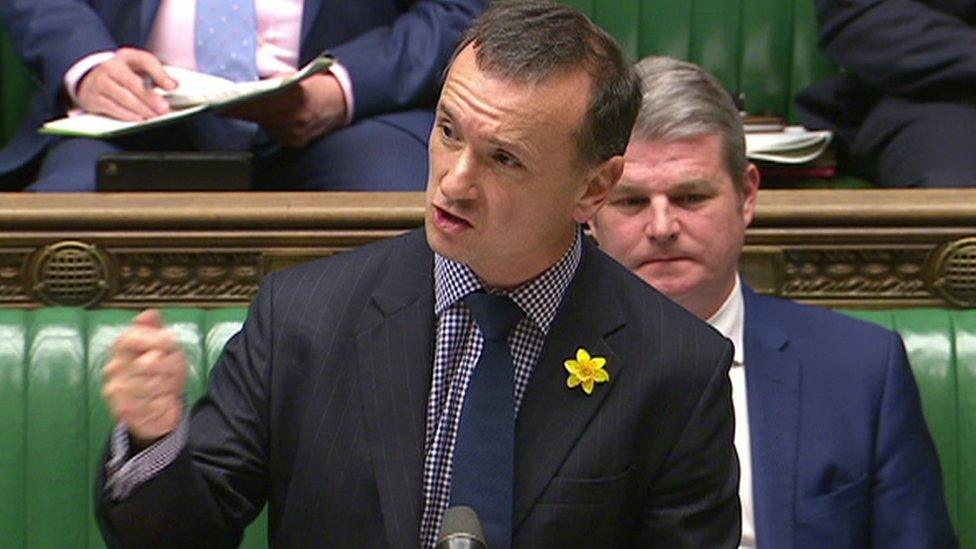Lagoons, power grabs and fuzzy rows
- Published
- comments

'No power grab' - Welsh Secretary Alun Cairns rejects criticism of the UK government's Brexit plans
If your Welsh Questions bingo sheet included "Swansea tidal lagoon," "rail electrification" and "power grab" then you could have shouted "House!" well before the half hour was up.
The discussion on the lagoon was shorter than on Tuesday, when the Business Secretary compared its cost unfavourably to that of a nuclear power station. Wales Office Minister Stuart Andrew re-stated the UK government's position that the scheme had to be value for money for taxpayers without giving any indication of the timing of a decision on its viability.
Several MPs complained about last July's decision to scrap rail electrification between Cardiff and Swansea. Some broadened the debate to take in the Welsh Government's own rail plans and whether they include electrified lines or not.
But the exchanges were dominated by Brexit and the UK government's alleged "power grab", with several SNP MPs seizing the chance to share the Scottish government's sense of grievance over Clause 11 of the European Union (Withdrawal) Bill.
'Settled will'
Welsh Secretary Alun Cairns insisted: "There is no intention of any power grab. Out of the 64 areas that relate to Wales, we have already said that 30 will pass without any need for any further agreement or at the very most an informal agreement between the UK government and the devolved administrations.
"There are 24 areas where it's in the interests of businesses in Wales and Scotland and Northern Ireland and in England to have common practices so we can protect the UK market. Eighty per cent of Welsh output is sold to the rest of the UK."
Shadow Welsh Secretary Christina Rees wanted to know if the transfer of powers to Westminster was a temporary measure why Mr Cairns planned to change the devolution settlement permanently "against the settled will of the people of Wales".
Plaid Cymru's parliamentary leader, Liz Saville Roberts, complained that amendments to the bill had been introduced without the agreement of the devolved administrations.
She raised the Welsh Government's "continuity Bill" and asking: "If it passes, debates over the power grab will be forced out of this chamber and into the courts. Will you confirm when the continuity Bill passes whether you intend to fight us in the courts?"
Mr Cairns didn't answer that point but said he didn't think the bill was necessary.
His predecessor, Stephen Crabb, shared some of his Wales Office memories, telling Mr Cairns: "As you know, the Welsh Labour Government in Cardiff loves nothing more than a long and fuzzy row with Westminster over powers. Do you agree with me that they would do much better to work constructively and pragmatically with ministers here to make a success of Brexit which is after all what the people of Wales voted for?"
Not surprisingly, Mr Cairns did agree. He also shared a few of his own Wales Office memories: "I've been in this position before where it was predicted that I would not get a legislative consent motion for the Wales Bill as that was progressing through Parliament but it's only by constant hard work and engagement and optimism on both sides, acting in the interests of business and communities, not in the interests of politicians."